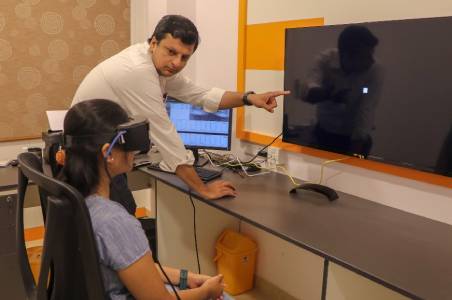DIZZINESS & VERTIGO
Comprehensive history A lot of time is spent in taking a detailed history. This pertains to the patients description of his/her symptoms. A detailed history often gives a clue as to the cause of dizziness.
Detailed clinical examination A bedside clinical examination by Vertigo treatment Doctor takes only a few minutes.
Highly sophisticated tests are done whenever needed to find out the cause for Dizziness & Vertigo. The tests include Videonystagmography (VNG), Video Head Impulse Test (VHIT) & Vestibular Evoked Myogenic Potential (VEMP). The tests can pinpoint the cause for Dizziness & Vertigo making treatment strategies effective.

Common causes for Dizziness & Vertigo
Benign Paroxysmal Positional Vertigo (BPPV)
This is the commonest cause of Vertigo. The Vertigo is triggered by lying down position & is attributed due to dislocation of Calcium crystals (Otoliths) in the inner ear. Can most often be treated by exercises called positioning manoeuvres.
Migraine
Migraine as most of us know is among the commonest causes for recurrent headaches.
The headache in a migraine sufferer is quite typical & shows the following pattern. However all the patterns to be described may not be present in the same patient.
A) The headache is usually one sided lasting for many hours & is accompanied by nausea & vomiting.
B) Sensitivity to light & noise is quite common
C) Visual symptoms like seeing flashes of light or dark spots
D) Perspiration at the time of headache
E) Headache triggered by consumption of Alcohol, Caffeine, Chocolates & Cheese
F) Headache triggered by lack of sleep & stress
Vertigo is also common with migraine patients. Recurrent dizziness lasting for hours in a patient with known history of migraine makes the diagnosis fairly easy.
Migraine to a great extent can be controlled by lifestyle modifications like good sleep, avoidance of diet triggers & stress management (through Yoga & meditation).
Patients with recurrent Migraine may need to take medicines.
Meniere’s disease
Patients with the above condition have a triad of symptoms which includes Dizziness with spinning sensation (Vertigo), Fluctuating hearing loss & ringing in the ear. The fourth compalint which may be added to this triad would be fullness in the ear.
The condition is due to excess fluid in the inner ear with resultant increased inner ear pressure.
Meniere’s disease is often one sided in the beginning, With many years the symptoms become bilateral (meaning on both sides). Diagnosis is based on the typical symptoms & supplemented with tests of hearing (Audiometry) & balance (like VNG & VHIT).
Treated with conservative measures like low salt diet, diuretics (to decrease pressure in the ears) & specific drugs.
Acute (Sudden) Vertigo
This is commonly due to inflammation of the balance nerve, a condition called Vestibular Neuritis. Patients have sudden onset of severe Vertigo with nausea & vomiting. Diagnosis is by a careful clinical examination & balance tests. Treatment will include Vestibular suppressants, Steroids (controversial), antiviral drugs (again controversial) & rehabilitation.
Another condition which can present with Acute Vertigo is a stroke. Its important to make a diagnosis of a stroke so that early treatment can be started.
Treatment for Vertigo
PHARMACOTHERAPY (MEDICINES)
The medicines fall into three categories
Vestibular suppressants
Vestibular suppressants minimise the symptoms not only of dizziness, but also accompanying symptoms like nausea & vomiting. Natural compensation is a very important step towards recovery. However long term use of suppressants can delay natural compensation & be counterproductive. Suppressants are therefore given to tide over the initial crisis for upto 5 days when symptoms could be distressing.
Medicines which improve vestibular compensation. Betahistine is one such medicine. They are very useful & given over long term in conjunction with exercises.
Specific medication to treat the underlying cause of vertigo
Vestibular Rehabilitation
This involves a set of exercises which are prescribed to the patient. The exercises are done as soon as the patient gets over the initial acute symptoms. The exercises when performed regularly improve the process of natural compensation.
Transtympanic Injections
Certain medicines are given transtympanically (meaning through the middle ear) as an injection. The drug so given can perfuse from the middle ear towards the inner ear & control the symptoms of dizziness. This is particularly useful in conditions like Meniere’s disease.
Surgery
Surgery has a limited but definite role in certain specific conditions leading to vertigo.
